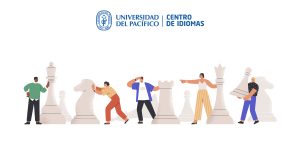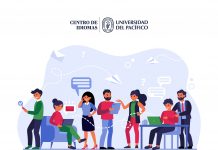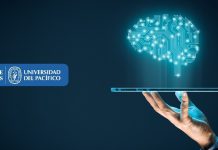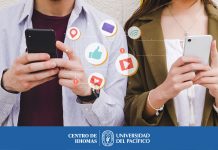Unquestionably, this year has been one of the most challenging ones, both in our professional as well as personal life. Yet, even though we have experienced demanding events, I do think that we all have learnt a lot. In circumstances like this, I keep the following saying in mind:
“When you come out of the storm, you won’t be the same person who walked in. That’s what this storm’s all about.” Haruki Murakami
So, we are in the process of constructing a new and better teacher, no doubt about that.
Meanwhile, it is a good practice to value what we have learnt, and I would like to share some lessons this pandemic has legated so far.
- We are not alone: We knew before this crisis that there were different players in the English teaching market. However, during this pandemic they became more relevant because they had experience in the online teaching industry. Because of the need of virtual learning, our students have found a new option in companies such as Duolingo, Busuu, Hello Talk, Open English, Udemy, Coursera, EdX and so on; they have become direct competitors. This new context has obliged us to go beyond the user knowledge of technology. In fact, we have learnt to use technology to our advantage. (1)
- Our students are transforming: In the beginning, it was difficult for most of our students to adapt to this new way of learning. However, their mental scheme and attitude are going through inevitable change. In order to update our teaching, we need to know our students’ new features. They have changed or strengthened. Here are some:
A.Pupils expect to be given in a hurry all the information they need: They are exposed to the contemporary high availability and immediacy of information. This causes their getting accustomed to reacting immediately to detect whether what they are reading is good, they process information faster, they discard some information quicker and immediately look for something better or different.
B. Pupils are becoming accustomed to obtaining diversified viewpoints: Students are exposed to much more material, updated material. This allows them to hear different opinions, which expands their viewpoint. Thus, they expect novelty.
C. Students want constant feedback: The online programs are designed to give immediate feedback. You finish one exercise, and right away you can access the outcome of it.
D. Students have developed or are already developing basic digital skills: These basic digital skills will be second nature to millennials and generation Zs: Digital foundation skills, communicating, transacting, handling information and content, problem-solving and being safe and legal online. Have we developed these and other skills? Are we in the process of developing them?
What have we done so far to keep up with these changes?
We have embraced the idea that one is never too experienced to brush up on tips or tools to perfect our teaching crafts. So, we had to learn as fast as we could, and it was a massive learning period! We decided to be the guide on the side rather than the sage on the stage (facilitator rather than lecturing teacher).
Here are some ideas of what we had to pull off and are still doing, or learning to do:
- Focus on the learning process: the teacher is no longer considered, or even expected to be, the store of knowledge. We are still experts in the field and can focus on the learning process, rather than on the content to be taught. Students are exposed to high availability and immediacy of information, so use that to our advantage. Let´s make technology work for us by telling our students how to use technology or any other existent resources.(1)
- Provide novelty: Students are looking for novelty, nothing more original than a learning experience tailored to their needs, right? We need to personalize the content and find the way to make it significant for the students. We need to narrow it down to students’ needs, environment, interests and level of language. Books are not made with our specific students in mind; they need to be used as reference. Learners need to have a goal, to see the objective, and if that matches their world, the journey becomes easier; the learning becomes more affective and effective as well.
- Contribute with tailored feedback: The majority of online courses available provide generic feedback, created for everybody without personalizing. Humans are goal driven creatures. (2) That´s why all learners want to have goals. They need to know they are moving towards an aim, and if students are given customized feedback, their mastery of content would be enhanced.
- Use technology intelligently: Instead of starting with a certain technology and striving to find a way to fix the problems we encounter, I suggest starting with the problem and consider the spectrum of technologies that might help solve it. For instance, are we trying to facilitate collaboration? What tools can we use for that? Lino.it/jamboard? Begin with some baby steps, do not overwhelm students or yourself. Start small!

I would like to end this post with some reflections and questions.
A common scenario: The health care sector has been the one that has suffered the most. Why? In many countries, the pandemic has exceeded the capacity of service; in some others, it has beaten the system. Some countries were more prepared than others. In the case of schools, some could continue in a way or another, but some had to close. Why?
Who could face this pandemic with less difficulty? Who has taken longer to adapt to this new normality? In which group were we? How can we be prepared for such an event?
We need to invest! We have to invest money and time. Regarding teaching, we need to at least invest time in learning new things. Many of us knew that technology was going to be part of our future, but we thought we had time and we did little or nothing to update our knowledge.
What we have done so far has been done in a state of emergency and I do believe that many of us have shown endurance, strength, willingness, creativity, resiliency, cognitive flexibility, empathy and many more qualities that we probably didn´t know we had. However, I do feel we cannot let the state of emergency be our normality. We need to act strategically: We need to become ready for the new students that the pandemic is cooking. We need to find out even more about the learning process in this new context, so that we can become the best option for our students. We need to be even more proactive than ever!
- Vila A., Flor de María (2020). Let´s make technology work for us Retrieved from
https://blogidiomas.up.edu.pe/2020/10/lets-make-technology-work-for-us/ Retrieved 30 November, 2020.
- Johannes H. Decker, A. Ross Otto, Nathaniel D. Daw, Catherine A. Hartley (2016) From Creatures of Habit to Goal-Directed Learners: Tracking the Developmental Emergence of Model-Based Reinforcement Learning Retrieved from
https://journals.sagepub.com/doi/abs/10.1177/0956797616639301 Retrieved 30 November, 2020.










